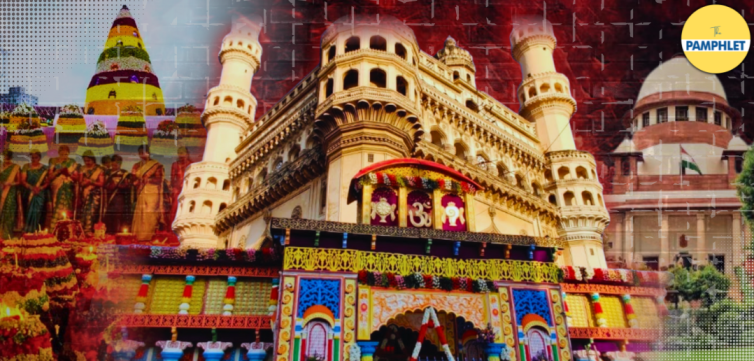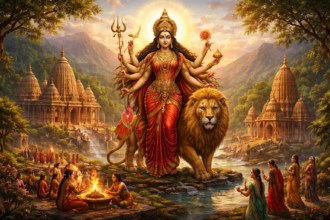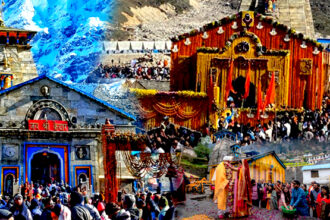Every Navratri brings with it not only prayers and rituals but also, increasingly, petitions and court orders. One is forced to ask: Is there any Hindu festival left in India that escapes judicial or administrative intervention?
The pattern is striking. In Congress or INDI-ruled states, devotees must knock on the doors of the courts just to perform their rituals. Elsewhere, courts themselves take the initiative to impose restrictions.
The result: “Hindu festival” and “court case” are now virtually interchangeable.
The most glaring recent example unfolded at Hyderabad’s Charminar, at the small yet politically charged Bhagyalakshmi Temple, during the women-centric Bathukamma festival.
Bathukamma 2025: Worship by court decree
In 2025, the script played out with mechanical predictability. Telangana police flatly denied permission for Bathukamma celebrations at the temple, citing the usual reasons: sensitive location, mixed-community demographics, law and order risks, traffic congestion, and inconvenience to tourists.
In short, before women could offer flowers to the goddess, they had to prove they were not a threat to public peace.
The BJP approached the High Court, and the court reluctantly allowed the event—but only under a list of conditions that made it look less like a festival and more like a parole:
- No more than 100 women participants.
- No VIPs.
- No political speeches or “offensive” songs.
- Strictly between 4:00 and 5:30 pm.
- All of it under police supervision.
The court justified itself by pointing out that “last year’s event passed peacefully, hence permission is granted again under strict limits.”
The same script in 2024
But this wasn’t new. In 2024, police had issued the same denial, invoking “sensitive area, narrow lanes, communal tensions, and traffic issues.” The Archaeological Survey of India (ASI) added fuel by labelling the temple “unauthorized construction within the protected Charminar complex.”
Once again, the High Court permitted the festival, but with nearly identical conditions: only 100 women, no VIPs, no speeches, no provocation, and with the police empowered to shut it down if any rule was broken.
Thus, year after year, the Bathukamma festival, meant to celebrate women and flowers, has been reduced to a courtroom ritual, where judges dictate how devotion must be performed.
A decades-old dispute
The controversy around the Bhagyalakshmi Temple is not new.
Charminar, built in 1591, is Hyderabad’s pride and a protected monument. Right beside it stands this modest temple, where thousands of devotees worship. Hindus insist it is an ancient shrine; Muslim organizations and “secular” historians claim it is a later-day encroachment.
The ASI has repeatedly called it unauthorised. Since the 1960s, the temple has been at the heart of tension, court cases, and even communal clashes in the 80s and 90s. For decades, the script has remained the same: if devotees gather, it is a “security issue”; if they worship, it is a “sensitive matter”; and eventually, it lands in court.
This is not just a place of worship anymore; it has become a symbol of political tug-of-war and judicial micromanagement of the Hindu faith.
The larger pattern: Festivals under trial
What is happening at Charminar is not isolated. Across India, Hindu festivals have been steadily boxed into court orders:
- Diwali: Crackers banned in the name of pollution.
- Holi: Restrictions on water and colours in the name of conservation.
- Ganesh Visarjan & Durga Puja: Courts fix immersion sites, timings, and noise levels.
- Kanwar Yatra: Routes diverted, DJs banned, processions capped.
- Janmashtami (Dahi Handi): Courts set height limits and age restrictions for participants.
- Chhath & Karva Chauth: Even where and how rituals may be performed is dictated by administrative orders.
The pattern is unmistakable: before celebrating, devotees must consult the Constitutional commentary, not their scriptures.
A woman-centric Festival, Cut to Size
Bathukamma is not just another festival; it is unique because it is entirely women-centric. Women gather with flowers, sing, dance, and offer prayers to the goddess. It is Telangana’s cultural signature, a festival of feminine devotion and strength.
And yet, in both 2024 and 2025, the court reduced it to a token gesture: “only 100 women, only 90 minutes.”
Ask yourself, will the state next say that women in Bihar can only gather in groups of 100 for Chhath Puja while the rest must stay home? Would it ever impose a “100 women” cap on Garba in Gujarat?
Why, then, is Bathukamma being micromanaged into irrelevance?
Already, Garba has been secularised—its religious core diluted, its grounds turning into a free-for-all religious space where harassment goes unchecked. Bathukamma now risks becoming the next target of this slow cultural hollowing.
Where does it stop?
The question is not just about one festival, or one temple, or one state. The question is: how far will this go?
Why is the responsibility for “law and order” always pushed onto the Hindu community—“Don’t celebrate, don’t gather, don’t provoke”—instead of onto those who actually disturb law and order?
Why must devotion be pre-approved by the judiciary? Why must women be told how, when, and in what numbers they may worship?
At Charminar, no restrictions are placed on other community celebrations. But for Hindus, the rule is 100 women, 90 minutes, and a police cordon. What does that say about our idea of “secularism”?
Perhaps it is simpler if the state just admits: “Don’t celebrate festivals—because we cannot guarantee people won’t throw stones.”
Until then, Hindu festivals will continue to mean not joy and devotion, but petitions, affidavits, and court-monitored rituals.









